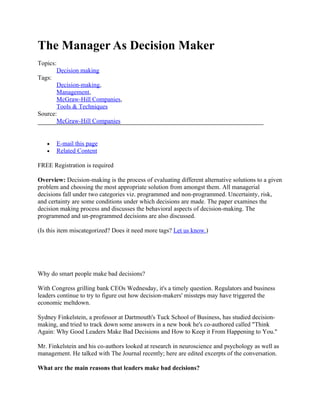
The manager as decision maker
- 1. The Manager As Decision Maker Topics: Decision making Tags: Decision-making, Management, McGraw-Hill Companies, Tools & Techniques Source: McGraw-Hill Companies • E-mail this page • Related Content FREE Registration is required Overview: Decision-making is the process of evaluating different alternative solutions to a given problem and choosing the most appropriate solution from amongst them. All managerial decisions fall under two categories viz. programmed and non-programmed. Uncertainty, risk, and certainty are some conditions under which decisions are made. The paper examines the decision making process and discusses the behavioral aspects of decision-making. The programmed and un-programmed decisions are also discussed. (Is this item miscategorized? Does it need more tags? Let us know.) Why do smart people make bad decisions? With Congress grilling bank CEOs Wednesday, it's a timely question. Regulators and business leaders continue to try to figure out how decision-makers' missteps may have triggered the economic meltdown. Sydney Finkelstein, a professor at Dartmouth's Tuck School of Business, has studied decision- making, and tried to track down some answers in a new book he's co-authored called "Think Again: Why Good Leaders Make Bad Decisions and How to Keep it From Happening to You." Mr. Finkelstein and his co-authors looked at research in neuroscience and psychology as well as management. He talked with The Journal recently; here are edited excerpts of the conversation. What are the main reasons that leaders make bad decisions?
- 2. Getty Images Leaders tend to rely on past experience that seems useful, but is actually sometimes dangerous. One of the most well known [examples] is Dick Fuld at Lehman. He saved Lehman in the aftermath of the LTCM crisis in the late '90s. Fast forward 10 years or so and he also, I believe, thought he would do it again. But the experience he was relying on was not the same as this massive housing-driven collapse. It's much more complex, much more complicated. We always talk about how important experience is. I think we overstate experience, because it doesn't exactly fit the situation you're in. You're liable to rely on it in a way that's just not going to be that helpful. Why else do people make bad decisions? A second reason has to do with self-interest. Most people don't realize self-interest operates at a subconscious level. We're not even aware of how self-interested we are. That is my take on the John Thain bonus story. Is there anyone who believes that he is not a smart enough guy to figure out that taking or giving [such large] bonuses [was not] a sensible thing to do? It doesn't make a lot of sense. So how do you explain it? My explanation is that it was the subconscious of his brain taking charge. Journal Community • Discuss: Why do managers make bad decisions? The third one is what we call prejudgments. Leaders make prejudgments about their businesses that sometimes turn out to be wrong. In the book we studied Hurricane Katrina. We looked at the Department of Homeland Security, the operations center. The head of that group made an early prejudgment that Katrina was not going to be much more different than any hurricane in Florida, and he stuck to that prejudgment. [He later testified to Congress] that he saw a report on CNN of people partying in the French Quarter, believed they had dodged a bullet. Meanwhile there were literally dozens and dozens of other data points flowing into the operations center saying it wasn't quite the party he was observing. Why does a smart experienced [leader] make a mistake like that? I think it's this vulnerability to prejudgment -- deciding something is the way it is early on and sticking to it no matter what.
- 3. Anything else? The fourth one is what we call attachments -- attachments to people or places or things. For example, company after company is engaged in downsizing and maybe selling off businesses. Whether or not that proceeds in the best way possible is going to depend in part on the extent to which the CEO and other members of the executive teams in these companies are aware of the attachments that they might have. Are they going to sell off a business they helped build themselves? How will they think about the types of people that they need to remove? What are some of the ways leaders can avoid making bad decisions? People need to recognize that we are biased in every single situation. There's no such thing as objectivity. The first thing leaders should do to reduce their odds of making bad decisions is walk into an important decision situation saying, "Ok, I know that we are potentially biased in a variety of ways. Let's try to identify what those are." Second is to avoid the "yes man" trap. You have to bring different people and different data sources to the table. You want to add a "no team" to argue against the proposal, and put some teeth behind that no team. What else do you suggest? Another idea is around governance. I've studied boards for --- it must be 15 or 20 years now. I'm completely convinced that the biggest differentiator between high quality boards and weaker boards is the extent to which they actually engage in real debate. Write to Erin White at erin.white@wsj.com
